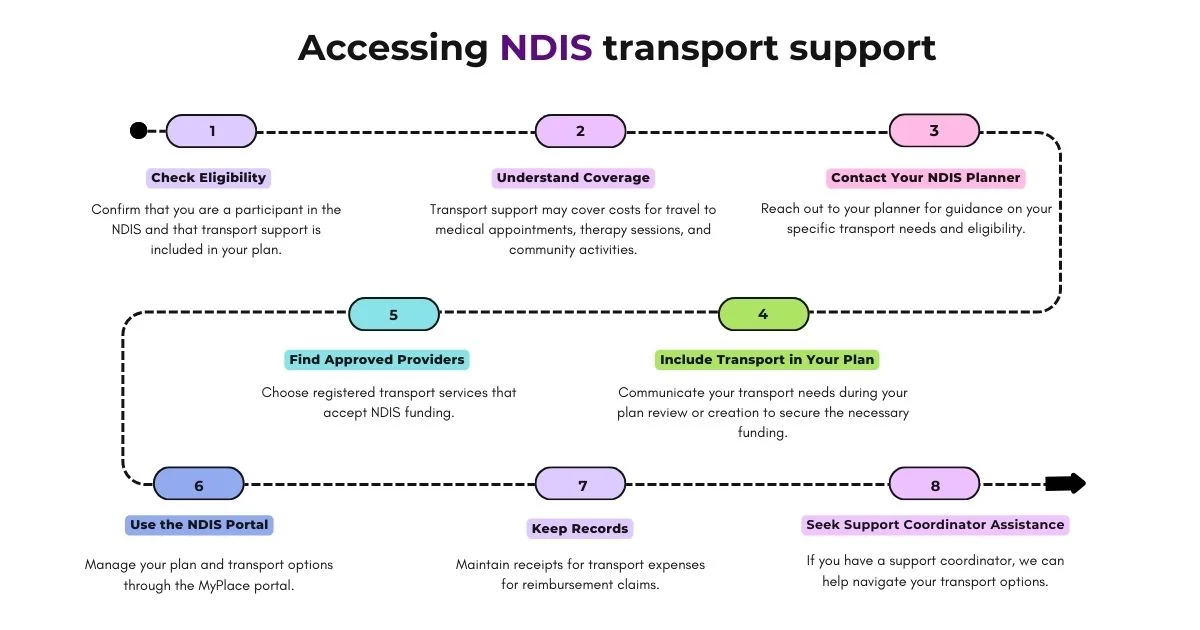The National Disability Insurance Scheme (NDIS) is designed to support individuals with disabilities by providing essential services and resources. One significant aspect of this support is transport assistance, which plays a crucial role in helping participants access essential services and engage with their communities. In this blog, we will explore the eligibility for NDIS transport support, the types of transport available, how to access these services, and the benefits we provide.
Eligibility for NDIS Transport Support
To be eligible for NDIS transport support, participants must meet specific criteria. Usually, transport support is for people who:
- Are participants in the NDIS and have an approved plan.
- Have a disability that impacts their ability to use conventional transport options.
- Require assistance to travel to essential appointments, community activities, or social events.
Eligibility can vary based on individual circumstances, so it’s important to discuss transport needs during the planning process with an NDIS planner or support coordinator.
Types of Transport Support Available
NDIS transport support comes in various forms, ensuring that participants can choose options that best meet their needs:
Transport Allowance
The NDIS provides funding for participants to cover their travel expenses, which may include fuel costs, vehicle maintenance, or public transport fares. The transport allowance can significantly ease the financial burden associated with travel.
Specialised Transport Services
Participants may have access to specialised transport services, including taxis, rideshare options, or wheelchair-accessible vehicles. These services meet specific needs and help people travel safely and comfortably.
Public Transport Assistance
The NDIS can assist participants in utilising public transport systems. This may include funding for tickets or subsidies to help cover costs. Understanding how to navigate public transport can empower participants and encourage independence.
How to Access NDIS Transport Support
Accessing NDIS transport support involves several steps:

- Check Eligibility: Confirm that you are a participant in the NDIS and that transport support is included in your plan.
- Understand Coverage: Transport support may cover costs for travel to medical appointments, therapy sessions, and community activities.
- Contact Your NDIS Planner: Reach out to your planner for guidance on your specific transport needs and eligibility.
- Include Transport in Your Plan: Communicate your transport needs during your plan review or creation to secure the necessary funding.
- Find Approved Providers: Choose registered transport services that accept NDIS funding.
- Use the NDIS Portal: Manage your plan and transport options through the MyPlace portal.
- Keep Records: Maintain receipts for transport expenses for reimbursement claims.
- Seek Support Coordinator Assistance: If you have a support coordinator, we can help navigate your transport options.
How to Include Transport Support in Your NDIS Plan
Including transport support in your NDIS plan is crucial for ensuring you receive the assistance you need. Here’s how to do it:
- Discuss During Planning Meetings:
Clearly express your transport needs during meetings with your NDIS planner. Be specific about how your disability affects your ability to travel. - Provide Evidence:
Submit any documentation that supports your request for transport funding, such as letters from healthcare providers or assessments outlining your mobility challenges. - Review and Adjust:
Regularly review your NDIS plan to ensure that transport support remains appropriate as your needs change. If necessary, request a plan review to adjust funding.
Benefits of NDIS Transport Support
NDIS transport support offers several key benefits to participants, including:
- Enhanced Independence: With reliable transport options, participants can travel to appointments, activities, and social events without relying solely on family or friends.
- Increased Social Inclusion: Access to transport allows individuals to engage with their communities, participate in social events, and build connections with others, reducing feelings of isolation.
- Improved Access to Services: Participants can attend essential medical appointments, therapy sessions, and other necessary activities regularly, leading to better health outcomes and overall well-being.
Conclusion
NDIS transport support is an important service that helps people with disabilities manage their daily lives more easily and independently. By understanding the eligibility criteria, types of transport available, and how to access this support, participants can make informed decisions that enhance their quality of life. If you have questions about NDIS transport support or need assistance in developing your plan, reach out for help. Together, we can ensure that your transport needs are met, allowing you to thrive in your community.

